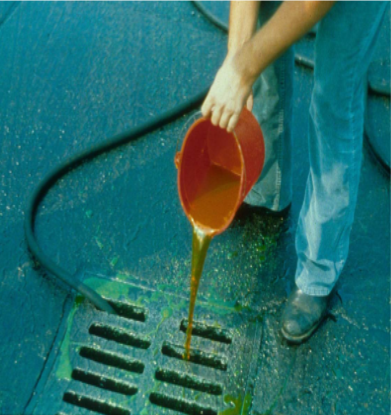IDENTIFYING & PREVENTING STORMWATER POLLUTION
 Stormwater runoff is water from rain that does not soak into the ground. It flows from rooftops, over paved areas, bare soil and sloped lawns. Municipal storm sewer systems, storm drain inlets, pipes and ditches collect storm water runoff and convey it directly to local bodies of water.
Stormwater runoff is water from rain that does not soak into the ground. It flows from rooftops, over paved areas, bare soil and sloped lawns. Municipal storm sewer systems, storm drain inlets, pipes and ditches collect storm water runoff and convey it directly to local bodies of water. Disposal of anything other than storm water in storm sewers is illegal. It is important to remember that municipal storm sewer systems are not set up to treat or process anything and exist solely to transport rain water to surrounding river, streams, and other bodies of water.
THINGS YOU CAN DO TO PROTECT OUR WATER QUALITY
- Never dump anything down storm drains
- Dispose of household waste properly
- Use fertilizer sparingly, sweep up any excess from driveways, sidewalks and roads
- Avoid pesticides
- Pick up after your pet
- Direct downspouts onto grassy areas away from paved surfaces
- Check vehicles for leaks
Ordinance 2008-03 - An ordinance regulating the disposal of household or commercial solid waste, tires and refuse within the Borough of Far Hills and establishing enhanced penalties for violations as authorized by statute
Ordinance 2015-13 - An ordinance regulating animal control and adopting a license fee schedule
Ordinance 2021-13 - An ordinance establishing tree removal and replacement regulations within the Borough of Far Hills
Ordinance 2021-01 - Updates and revises Section 916 Entitled "Stormwater Management" of the Land Management Ordinance of the Borough of Far Hills in compliance with the regulations governing stormwater control and management pursuant to the NJDEP
Ordinance 2023-21 - An Ordinance Establishing Regulations for Yard Waste - NJDEP Stormwater Regulations
Ordinance 2023-22 - An Ordinance Prohibiting the Feeding of Wildlife on Public Property - NJDEP Stormwater Regulations
Ordinance 2023-23 - An Ordinance Establishing Regulations for Private Storm Drain Inlet Retrofitting - NJDEP Stormwater Regulations
Ordinance 2023-24 - An Ordinance Prohibiting the Improper Disposal of Waste in Storm Sewer System - NJDEP Stormwater Regulations
Ordinance 2023-25 - An Ordinance Prohibiting Illicit Connections to Separate Sewer System - NJDEP Stormwater Regulations
Ordinance 2023-26 - An Ordinance Establishing Regulations for Storage of Salt on Private Property - NJDEP Stormwater Regulations
Stormwater Pollution Prevention Plan r. 1.22.2024
Stormwater Management Plan
2023 Stormwater Inspection Map
 Share This or
Share This or


